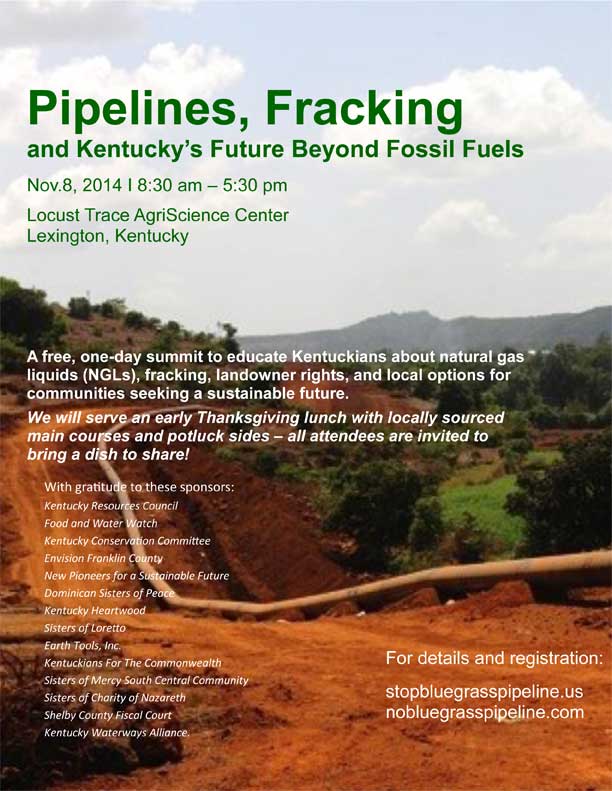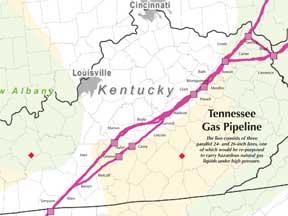Fracking, More Pipeline Proposals and Better Energy Choices to be considered at November 8 SummitAfter stopping the Bluegrass Hazardous Liquids Pipeline, victors look for additional ways to protect Kentucky
Additional Contact
Sister Claire McGowan
New Pioneers for a Sustainable Future 859-336-5070
[email protected]
Online Registration
www.stopbluegrasspipeline.us or www.nobluegrasspipeline.com.
Map
The Summit will take place at the Locust Trace AgriScience Center (3591 Leestown Road) in Lexington, Ky 40511
Resources
Map of Tennessee Gas Pipeline proposed to be repurposed to carry Natural Gas Liquids
Kentuckians can learn more about the issues of natural gas liquids (NGLs), fracking, landowner rights and local options for communities seeking a sustainable future at a day-long summit November 8 in Lexington.
The "Pipelines, Fracking and Kentucky’s Future Beyond Fossil Fuels" summit was organized by landowners and others who successfully stopped the proposed Bluegrass Hazardous Liquids Pipeline. That high-volume, high-pressure pipeline would have carried volatile fracking byproducts from Pennsylvania across Kentucky to the Gulf Coast for processing and export. The companies involved announced in April that they were suspending the project despite having spent nearly $100 million.
“Kentucky lies between the booming fracking industry to the northeast and the processing facilities on the Gulf Coast. Just as we experienced with the proposed Bluegrass Pipeline and are seeing with the Tennessee Gas Pipeline, Kentucky is destined to be hit by more pipelines,” explained summit organizer Chris Schimmoeller. “This summit is designed to educate Kentuckians about fracking and what people can do to protect our land and communities. I urge everyone to educate themselves before a company comes knocking at their door."
A second natural gas liquids (NGL) pipeline has been proposed that would run through Greenup, Carter, Lewis, Rowan, Bath, Montgomery, Clark, Madison, Garrard, Boyle, Marion, Taylor, Greene, Hart, Metcalf, Barren, Allen and Simpson counties.
That also would be a high-volume, high pressure line carrying up to 400,000 barrels per day. However, instead of a newly constructed pipeline, companies Kinder Morgan and MarkWest propose to re-purpose a decades-old natural gas pipeline to carry NGLs.
That should spark (pun intended) concern among landowners and communities along the proposed route, said Bob Pekny, who lives near the proposed Bluegrass Pipeline route in Woodford County and studied its dangers.
“Given the fact that the smallest leak that can be detected by the monitoring systems used by pipeline companies is about 300,000 gallons per day, it jeopardizes the safety of residents all along the route in the event of a leak or explosion of the pipeline,” Pekny explained. “The odorless, colorless, highly explosive vapor cloud that could form could mean instant death for anyone in a motor-driven vehicle that unknowingly encountered it."
Kinder Morgan representatives recently started contacting local officials with information about their proposed pipeline project. Local opposition – including 13 fiscal courts that passed resolutions – helped stop the proposed Bluegrass Pipeline.
During the debate about the proposed Bluegrass Pipeline, the project’s developers – in an attempt to show the pipeline might have some use in Kentucky – said its construction would lead to new exploration and extraction of oil, gas and related byproducts, particularly from the New Albany Shale region.
That’s a large area centered in the Illinois basin that includes nearly two dozen western Kentucky counties extending into central Kentucky.
That set off alarms for landowners concerned about the dangers and health impacts of fracking and pipelines. Having learned what’s happening in Pennsylvania, Ohio, North Dakota, Colorado and other states – where large-scale fracking and wastewater disposal are linked to health problems, contaminated surface and ground water, earthquakes, loss of land values and a host of other problems – they decided Kentuckians need to take control of what the state’s energy future holds rather than become its victims.
"We continue to be deeply concerned about the risks to landowners, to the general public and to the land, water, and air which result from new methods of extracting and transporting natural gas liquids in such high volumes, at such high pressure and over such long distances,” said Claire McGowan, Dominican Sister of Peace and director of New Pioneers for a Sustainable Future in Springfield. “We are especially concerned about these risks when companies seek to "repurpose" old, worn-out natural gas lines into conduits for even more dangerous natural gas liquids.
“It is essential that Kentuckians understand these issues well and act together to protect our healthy interests," she added.
Workshops and presentations during the summit will focus on fracking in Kentucky, the dangers of re-purposed pipelines, and Kentucky’s role in the national and international energy landscape.
"Fracking is already happening in Kentucky. Summit attendees will get more information about where it's occurring, the types, and what we can all do to as citizens to ensure our significant freshwater resources are protected,” said Tim Joice of the Kentucky Waterways Alliance.
Unconventional fracking techniques – principally horizontal drilling and the need for large volumes of water – that have caused problems in other states have been introduced in Kentucky on a smaller scale in recent years. That trend is likely to continue and grow as drilling companies look to deeper shale formations in northeastern and western Kentucky.
Sessions will also focus on possibilities of renewable energy for Kentucky, landowners’ rights, what local governments can do to protect their people and land, and working for political change.
The summit will take place on Saturday, November 8 from 8:30 a.m. to 5:30 p.m. at the Locust Trace AgriScience Center (3591 Leestown Road) in Lexington.
Thanks to many sponsors and supporters, this will be a free event. However, folks are encouraged to preregister to provide a count for lunch. Attendees are invited to bring a side dish or dessert to contribute or to make a donation towards the meal at the event.
Online registration is available at www.stopbluegrasspipeline.us or www.nobluegrasspipeline.com.
“We hope that this summit will serve Kentuckians by supplying much needed information about these significant issues.” said Schimmoeller. “Additionally, we hope that the summit will clearly articulate safe, renewable and economically viable energy alternatives to fossil fuels.”
Sponsors of the summit include Kentucky Resources Council, Food and Water Watch, Kentucky Conservation Committee, Envision Franklin County, New Pioneers for a Sustainable Future, Dominican Sisters of Peace, Kentucky Heartwood, Shelby County Fiscal Court, Sisters and Co-Members of Loretto, Earth Tools, Inc., Kentuckians For The Commonwealth, The Sisters of Mercy South Central Community, The Sisters of Charity of Nazareth, and Kentucky Waterways Alliance.
######
- Home
- |
- Sitemap
- |
- Get Involved
- |
- Privacy Policy
- |
- Press
- |
- About
- |
- Bill Tracker
- |
- Contact
- |
- Links
- |
- RSS



